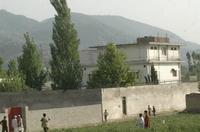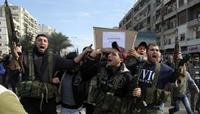-
Interpol issues global alert following nine al Qaeda-linked prison breakouts
Interpol, in a statement issued from the organization’s headquarters in Lyon, France, urged law enforcement agencies around the world to show “increased vigilance,” following prison breakouts over the past nine month in nine countries, including Iraq (22 July), Libya (27 July), and Pakistan (31 July). More than 2,500 terrorists have escaped in these nine prison breakouts.
-
-
FBI terrorism unit investigates animal rights group after pheasant farm attack

An FBI Joint Terrorism Task Force has launched an investigating after an animal rights group announced on its Web site that its members cut open fencing around a and releasing more than a dozen pheasants from the aviary at Ash Grove Pheasant Farm and Orchard in Riverside, California. The incident took place 22 July.
-
-
U.S. closes 21 embassies, issues travel alert following “credible” al Qaeda threat
The U.S. State Department issued a travel alert Friday warning al Qaeda may launch attacks in the Middle East, North Africa, and several other places. The department also closed twenty-one embassies and consulates this weekend. “Current information suggests that Al Qaeda and affiliated organizations continue to plan terrorist attacks both in the region and beyond, and that they may focus efforts to conduct attacks in the period between now and the end of August,” the State Department said in a statement.
-
-
Two Chicago terrorism cases bring the issue of expanded surveillance to the fore
A Chicago attorney representing a teenager facing terrorism charges raised concerns during a pre-trial hearing about whether expanded surveillance methods were used in her client’s case. This is the second time in less than a month that the issue of expanded surveillance methods was brought up in a Chicago terrorism case.
-
-
Details of al Qaeda’s “next generation” bomb, aborted effort to take out its designer, emerge
Al Qaeda engineers have been working on designing a sophisticated bomb powerful enough to bring down passenger planes but which is designed to avoid detection by explosives detection machines or trained dogs at airports. “All of our explosive detection equipment wasn’t calibrated to detect [this type of bomb]” TSA director John Pistole said. “And all of our 800 bomb-sniffing dogs had not been trained for that specific type.” A CIA informant inside a Yemeni cell of al Qaeda volunteered to place the bomb on a U.S.-bound plane, but instead delivered it to his CIA handlers in Saudi Arabia. A CIA effort to learn more about the bomb maker, Ibrahim Hassan Asiri, and take him out was aborted when someone leaked the story to AP. The news service refused pleas by the administration to postpone publication of the story until the end of the operation. The AP did agree to delay publication by a week to ten days to allow the CIA to extricate the agent and his family from Saudi Arabia to safety before publication. Asiri and his bomb-making assistants are still at large.
-
-
Ukrainian man in U.K. court charged with anti-Muslim terrorism
Pavlo Lapshyn, a 25-year-old postgraduate student from Dnipropetrovsk, Ukraine, appeared in a Westminster, U.K. court Tuesday and charged with the terror-related April murder of an 82-year-old Mohammed Saleem as Saleem was walking home from a mosque. Lapshyn has also been charged with three additional offenses related to three explosions near mosques in Walsall, Wolverhampton, and Tipton.
-
-
Florida teen indicted on terrorism charges
Shelton Thomas Bell, 19, of Jacksonville, Florida has been indicted on federal charges of conspiring to provide material support to terrorists. The indictment claims Bell planned to travel to Arabian Peninsula and join Ansar Al-Sharia (AAS), an alias for Al Qaeda in the Arabian Peninsula, to take part in “jihad.”
-
-
DHS raises Phoenix’s terror-risk ranking
DHS has raised Phoenix’s terrorist risk assessment three spots, from number eighteen to number fifteen. The change will entitle the city to $5.5 million in a federal security grant, $1.5 million more than it received from the same grant last year.
-
-
Pa. man sentenced to 8 ½ years for running a terrorism-promoting Internet forum
A western Pennsylvania man has been sentenced to eight and a half years in prison for leading an Internet forum which promoted terrorist attacks against American military and civilian targets. Emerson Begolly, 24, of Redbank Township was also convicted of having a concealed gun and biting an FBI agent when he was arrested in 2011.
-
-
OBL: Hiding in plain sight

Osama bin Laden had been living in his walled Abbottabad compound for nearly ten years, within sight of an elite Pakistani military academy, and gone completely unnoticed. According to a scathing official Pakistani report, the incompetence and negligence of Pakistan’s Inter-Services Intelligence (ISI) failed to realize that the world’s most sought-after terrorist leader had been living in Pakistan, until he was killed in a night-time raid by U.S. Navy SEALs on 2 May 2011.
-
-
Giuliani says political correctness hampers fight against domestic terrorists
The Department of Defense initially described Army Major Nidal Hassan’s Fort Hood shooting spree as “terrorism,” but quickly changed that definition to “workplace violence.” Testifying before a congressional panel, former New York City mayor Rudy Giuliani criticized DoD’s decision, and political correctness more generally, saying that “You can’t fight an enemy you don’t acknowledge.”
-
-
Russia: Syria rebels used sarin gas
Vitaly Churkin, Russia’s UN ambassador, announced at a UN news conference Tuesday that scientific analysis by Russian labs of a suspected chemical weapons attack in Syria on 19 March concluded the attack probably had been carried out by rebels using sarin nerve gas of “cottage industry” quality. He said the gas was delivered by a crudely made missile.
-
-
Gen. Dempsey: Syria could be a “10-year issue”

The U.S. top soldier said the United States is facing a “10-year issue” in Syria: “if we fail to think about [the Syrian issue] as a 10-year regional issue, we could make some mistakes,” General Martin Dempsey, chairman of the Joint Chiefs of Staff, said.
-
-
Jihadi cleric Abu Qatada deported from U.K. to stand trial in Jordan

After eight years of protracted and costly legal battles, Jihadi cleric Abu Qatada was deported from the United Kingdom to Jordan. Sunday morning he was flown on private chartered jet, accompanied by four British police officers, who handed him over to their Jordanian counterparts. Abu Qatada’s deportation to his native Jordan has cost the U.K. government a total o £1.7 million, of which£647,658 went to pay for the public defenders of the cleric.
-
-
Nigerian Islamic extremists burn children alive during attack on boarding school

At least twenty-nine high school students and a teacher are dead after militants from the Islamic Boko Haram group attacked a boarding school in northeast Nigeria. The Islamists set the school dorm on fire while students, aged 10 to 15, were sleeping inside. Most of the dead were burned alive inside the dorm. The militant waited outside the dorm, and shot those who tried to escape the burning building.
-
More headlines
The long view
How Male Grievance Fuels Radicalization and Extremist Violence
By Haily Tran
Social extremism is evolving in reach and form. While traditional racial supremacy ideologies remain, contemporary movements are now often fueled by something more personal and emotionally resonant: male grievance.
